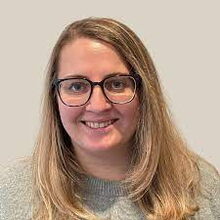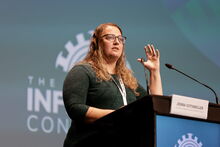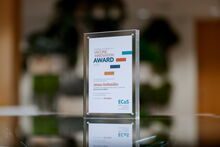Meet the winner of the Young Scientist Vaccine Innovation Award: Jenna Guthmiller
Who are you?
I am Jenna Guthmiller, an assistant professor in the Department of Immunology and Microbiology at the University of Colorado Anschutz Medical Campus.
What is your educational background?
I received my undergraduate education in Biology, Biotechnology, and Microbiology at South Dakota State University, where I conducted undergraduate research on zoonotic viruses, including the newly identified influenza D virus family. I went on to receive my PhD in Immunology from the University of Oklahoma Health Sciences Center in 2017, where I conducted research on why hosts fail to generate protective humoral immunity against Plasmodium sp. parasites. I conducted my postdoctoral training with Dr. Patrick Wilson at the University of Chicago, where I shifted my focus to understanding how distinct viral exposures shape broadly protective humoral immunity against influenza viruses. What is your current area of research focus? My independent laboratory focuses on how humans can generate broadly protective immunity, first by understanding what broadly protective humoral immunity looks like and second how vaccines can better induce these responses.
How do you foresee your respective awards contributing to your further development?
It is an incredible honor to receive this award and to be recognized for my work to understand how humans generate humoral immunity to influenza viruses. This award reenforces my commitment to dissect human immune responses to influenza viruses to inform rational vaccine design.
What do you perceive as some of the main challenges early career scientists must/need to overcome?
Being an early career scientist is incredibly challenging, whether it be long hours, job insecurity, and experimental failures. I think it is important that early career scientists understand that there is light at the end of the tunnel and that your science will come together with perseverance and hard work. Rome wasn’t built in a day, and neither is a successful research project!
In your opinion, how do international conferences like ESWI benefit early career scientists?
Especially as young scientists, our scientific understanding of a problem is largely shaped by our immediate and regional colleagues. Participating in international conferences, such as ESWI, serve as important opportunities to break those world views, expand our knowledge of key problems, and incorporate these diverse opinions into our research. Influenza viruses are a global problem, and it is important that we understand the global ongoing research and find ways to synergize to combat this ever-present threat. As an American who conducted most of my influenza research during the COVID-19 pandemic, this will be my first ESWI. I look forward to connecting with other young scientists and expanding my scientific network in Europe and throughout the world!

Jenna Guthmiller earned bachelor’s degrees in Biology, Biotechnology, and Microbiology from South Dakota State University in 2013. She earned a PhD in Microbiology and Immunology under the mentorship of Dr. Noah Butler at the University of Oklahoma Health Sciences Center in 2017. She completed her postdoctoral training at the University of Chicago with Dr. Patrick Wilson.
The Guthmiller lab is interested in understanding how broadly protective humoral immunity against influenza viruses develops and can be harnessed by vaccination. We are also interested in understanding the co-evolution of influenza viruses and the humoral immune response.
- The adaptive immune system does not respond to all parts of an antigen evenly, a phenomenon known as immunodominance. In the context of influenza, the B cell response is preferentially induced against the variable epitopes of the hemagglutinin (HA) domain rather than more conserved epitopes of the HA stalk domain. We are investigating the factors that regulate immunodominance and developing tools to shift immunodominance to the HA stalk domain.
- The breadth and specificity of the humoral immune response against influenza viruses is shaped by past influenza virus exposure. We are investigating how past exposures and exposure routes shape the development of broadly neutralizing antibodies.
- Antigenic drift of influenza virus HA is driven to evade host antibody responses. We are dissecting how 1) antibodies against distinct epitopes shape viral evolution and 2) and how viral evolution shapes infectivity and pathogenesis.


